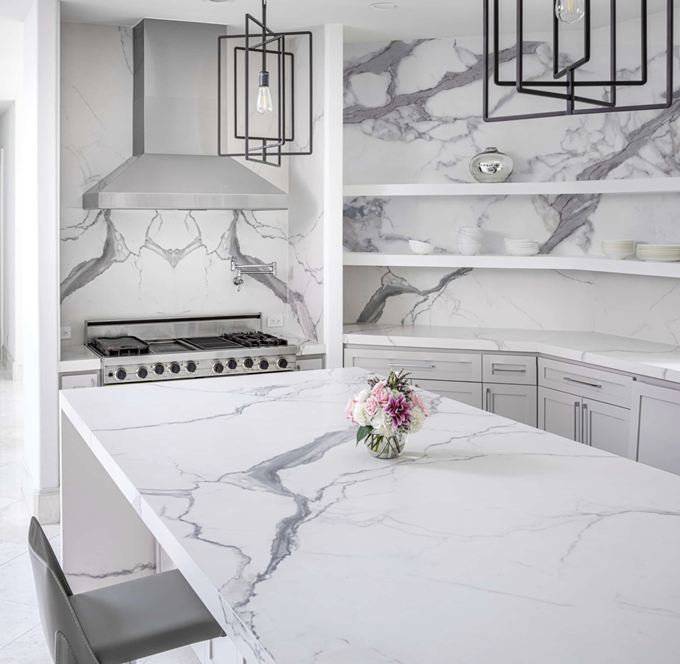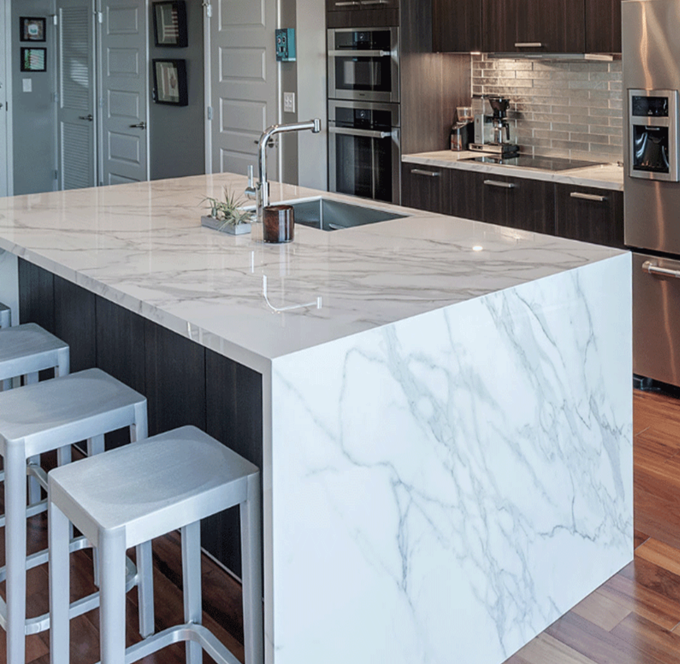Porcelain VS Quartz


Porcelain:
- Durability: Porcelain is extremely hard and resistant to scratches, heat, and UV light. It’s ideal for both indoor and outdoor use, as it won’t fade or degrade in sunlight.
- Design Versatility: Porcelain slabs can mimic the appearance of natural stone, wood, or concrete, offering a wide range of design options. They come in various finishes, from matte to glossy.
- Thickness and Weight: Porcelain is generally thinner and lighter than quartz, which can be advantageous in certain design applications. However, this also means it can be more prone to chipping along the edges.
- Maintenance: Porcelain is non-porous, making it resistant to staining and easy to clean. It does not require sealing, and its low maintenance is a significant benefit.
- Installation: Due to its thinness, porcelain requires careful handling during installation. It can be more difficult to work with than quartz, and specialized tools and expertise are often needed.
Quartz:
- Durability: Quartz is also highly durable, with excellent resistance to scratches, stains, and impacts. It’s not as heat-resistant as porcelain, so caution is needed with hot pots and pans.
- Design Options: Quartz is available in a wide range of colors and patterns, including some that mimic the look of natural stone like marble or granite. It has a more consistent appearance than natural stone.
- Thickness and Weight: Quartz slabs are generally thicker and heavier than porcelain, which can provide a more substantial look and feel. This thickness can also make quartz more durable in terms of edge chipping.
- Maintenance: Like porcelain, quartz is non-porous and easy to maintain. It’s resistant to staining and does not require sealing, making it a low-maintenance option.
- Installation: Quartz is easier to work with during installation due to its thickness and weight, reducing the risk of breakage. It’s a popular choice for its ease of use and wide availability.
Key Differences:
- Heat Resistance: Porcelain has higher heat resistance, making it better suited for areas exposed to high temperatures.
- UV Resistance: Porcelain doesn’t fade under UV light, making it ideal for outdoor spaces, while quartz can discolor if exposed to direct sunlight over time.
- Thickness and Weight: Porcelain is thinner and lighter, which can be beneficial for certain designs but may require more careful installation. Quartz offers a thicker, more substantial option.
- Edge Chipping: Porcelain is more prone to edge chipping due to its thinness, while quartz’s thicker slabs are more resistant.
Which to Choose?
- Porcelain is a great choice for those looking for a durable, heat-resistant, and UV-stable material with a modern, thin profile. It’s particularly well-suited for outdoor kitchens or spaces with high sunlight exposure.
- Quartz is ideal for those who prefer a thicker, more substantial benchtop with a wide range of color and pattern options. It’s easier to work with and install, making it a popular choice for indoor kitchens.
Your choice will depend on your specific needs, design preferences, and where you plan to install the benchtop.